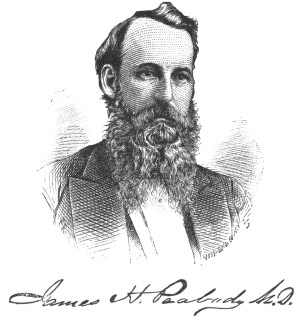Cholera was the most dreaded disease of overland travelers passing through the state in 1849 and the 1850s, and its possible recurrence was dreaded for decades afterward. Physician James H. Peabody helped fight an outbreak in Omaha in 1867. Dr. Peabody first came to Omaha in July 1864 during the Civil War, during which he served as a surgeon. He was later recognized by President Andrew Johnson for meritorious service during the war.
The Omaha Daily Bee on September 20, 1892, published an interview with Dr. Peabody, who consulted his past medical notes for details of the 1867 epidemic: “September 15, 1867, just a quarter of a century since, I was called to see one John M. Bury at the boarding house of Thomas Finan which was situated at No. 212 South Tenth street on the site now [1892] occupied by Hose company No. 2. On inquiry I found he had just come up from Memphis, Tenn., where cholera was raging. . . . He died in collapse in less than twenty-four hours.
“The next day his landlord, Thomas Finan, was taken down and quickly following his wife and three or four daughters, I forget which. They all recovered in ten days except his daughter Mary, a bright girl of 18, who succumbed to the fell disease on the third day of the attack. The house was full of boarders at my first visit, but they scampered off like rats from a sinking ship. It was almost next to impossible to get anyone to feed and nurse the Finan family, who were nearly all helpless. I made from five to six visits a day until all were considered out of danger. . . .
“There were a number of cases in various parts of the city, say about sixty in all, although owing to the fact that we had no registry law and but few of our physicians cared to take notes of their cases it seems impossible to get the number.” During this trying period Dr. Peabody contracted cholera from one of his patients but fortunately recovered. He told the Bee: “No one who has not witnessed the rapidity of death in claiming a victim in this disease can imagine the panic that ensues. Men and women with some few exceptions seem to think that their first duty is to save themselves and not to look after their neighbor and they act according.”
Dr. Peabody also recalled the public health measures used to fight the spread of cholera in 1867: “Dr. Conkling was our health officer and he was an excellent one, disinfecting most thoroughly by taking all the beds, bed clothing, carpets and everything else he thought might serve as a means of infection and burning them up. I fumigated the houses where my patients had been with sulphur, had everything whitewashed or painted, burned all the clothing I could get access to and with the assistance of the other physicians stamped out cholera and preserved Omaha from getting a backset just as she had recovered from the effects of the [Civil] war.”

From Alfred T. Andreas, History of the State of Nebraska (1882).



